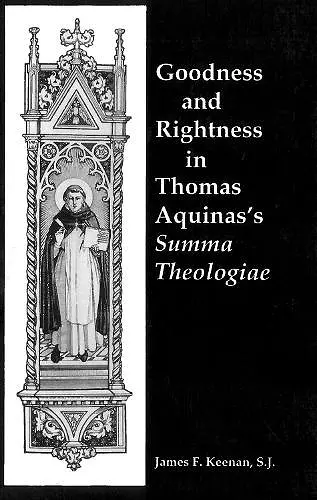Goodness and Rightness in Thomas Aquinas's Summa Theologiae
Format:Paperback
Publisher:Georgetown University Press
Published:1st Nov '92
Currently unavailable, and unfortunately no date known when it will be back

This clear and cogently argued work will engage not only theologians and medievalists, but moral philosophers as well... Keenan's careful analysis of the texts, coupled with his obvious mastery of the contemporary discussion, make this a particularly valuable work. -- Joan Franks, OP, Fordham University [The author] shows a sure mastery of both contemporary moral theology and of the sources of the Catholic Tradition. He should be one of those who shape the next generation of American Catholic moral theology. -- John P. Langan, SJ, Georgetown University
An appraisal of two of the most fundamental terms in the moral language of Thomas Aquinas that draws on the contemporary moral distinction between the goodness of a person and the rightness of a person's living.This appraisal of two of the most fundamental terms in the moral language of Thomas Aquinas draws on the contemporary moral distinction between the goodness of a person and the rightness of a person's living. Keenan thus finds that Aquinas' earlier writings do not permit the possibility of such a distinction. But in his mature works, specifically "The Summa Theologiae", Thomas describes the human act of moral intentionality, and even the virtues in a way analogous to our use of the term moral rightness. To Thomas, only the virtue of charity expresses moral goodness. And, although Thomas describes vices and sin as wrong conduct, he never really develops a description for moral badness. Keenan compels us to carefully examine Thomas' central moral concepts and to measure them against contemporary standards for meaning and correctness. As a result, any student of Thomas will find here a forceful argument that his notion of the good is considerably different from ours. Similarly, ethicists and moral theologians will find in the Thomas presented here a consistent-virtue ethicist concerned with descriptions for right living. Any student of theology will also find here a Thomas whose critical and concrete thinking enabled him to develop and even abandon earlier positions as his comprehension of the Good evolved. This analysis prompts a re-examination of our own concepts. Measuring Thomas' standards against our own, Keenan obliges us to ask whether we sufficiently understand rightness and moral intentionality. He also asks whether we correctly describe what it means to will or to desire something. He further questions whether we have surrendered our understanding of the virtues to the voluntarism and subjectivism which Thomas relentlessly critiqued. This historically sophisticated reading of "The Summa Thologiae" both allows Thomas to speak again as he once did, and affords us the chance to evaluate the way we describe ourselves and one another as being good and living rightly.
ISBN: 9780878405305
Dimensions: unknown
Weight: 367g
224 pages